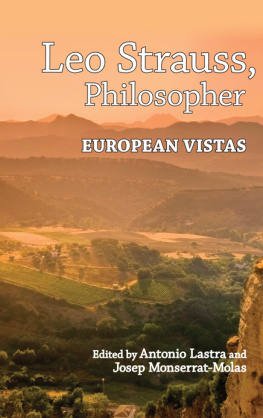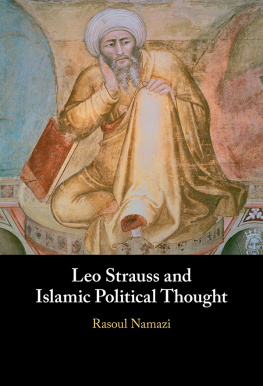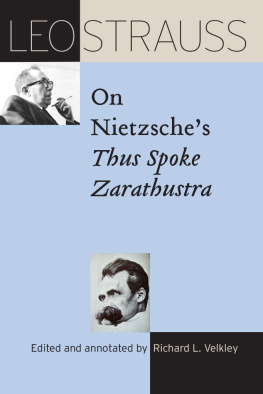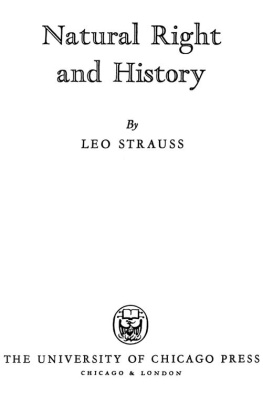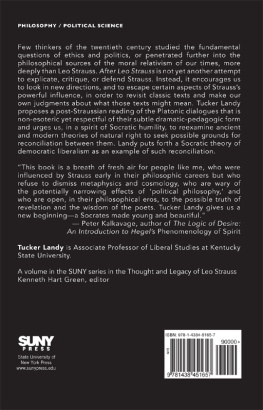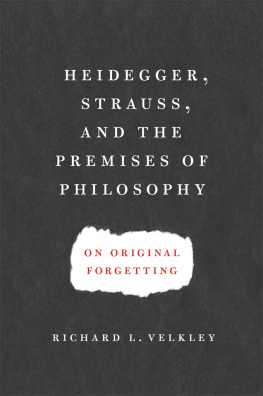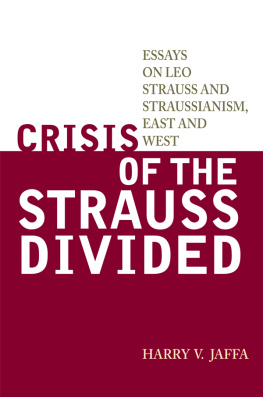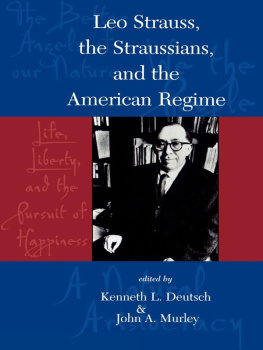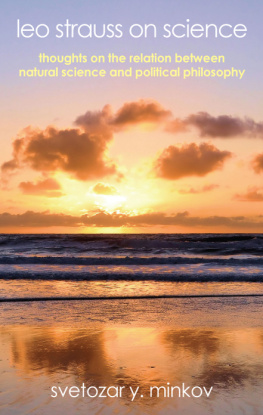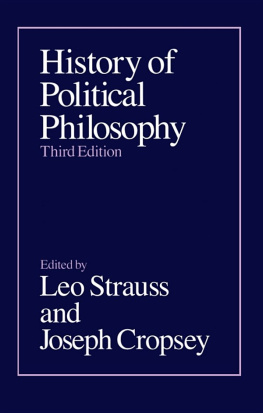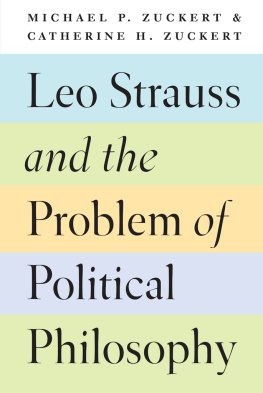LEO STRAUSS, PHILOSOPHER
SUNY series in the Thought and Legacy of Leo Strauss
Kenneth Hart Green, editor
LEO STRAUSS, PHILOSOPHER
European Vistas
EDITED BY
Antonio Lastra
and
Josep Monserrat-Molas
Published by State University of New York Press, Albany
2016 State University of New York
All rights reserved
Printed in the United States of America
No part of this book may be used or reproduced in any manner whatsoever without written permission. No part of this book may be stored in a retrieval system or transmitted in any form or by any means including electronic, electrostatic, magnetic tape, mechanical, photocopying, recording, or otherwise without the prior permission in writing of the publisher.
For information, contact State University of New York Press, Albany, NY
www.sunypress.edu
Production, Jenn Bennett
Marketing, Michael Campochiaro
Library of Congress Cataloging-in-Publication Data
Leo Strauss, philosopher : European vistas / edited by Antonio Lastra and Josep Monserrat-Molas.
pages cm. (SUNY series in the thought and legacy of Leo Strauss)
Includes bibliographical references and index.
ISBN 978-1-4384-6133-5 (hardcover : alk. paper) ISBN 978-1-4384-6135-9 (e-book) 1. Strauss, Leo. I. Lastra, Antonio, editor.
B945.S84L46 2016
181'.06dc23
2015030794
10 9 8 7 6 5 4 3 2 1
In memoriam
George Anastaplo (19252014), Constitutionalist
Stanley Rosen (19292014), Metaphysician
CONTENTS
A NTONIO L ASTRA
C ARLO A LTINI
A LESSANDRA F USSI
J ORDI R. S ALES -C ODERCH
M AURO F ARNESI C AMELLONE
T ILL K INZEL
J OSEP M ONSERRAT -M OLAS
PREFACE AND ACKNOWLEDGMENTS
, .
Clement of Alexandria
Stromata I. i.15.14
T he University of Freiburgs announcement of plans to transform the philosophy chair, which was held in the first half of the twentieth century by Edmund Husserl and Martin Heideggerwho gave his controversial inaugural address as rector there on The Self-Assertion of the German University has stirred up the quiet and sometimes stagnant waters of the academic community both within and outside Germany with the force of a flood. The replacement of the prestigious chair by a junior professors post in logic and analytic philosophy of language not only signals an erosion in the professional status of the posts occupant, but is also an evidence that the modern adagethere are nowadays professors of philosophy, but not philosophersis, to some extent, right. The adage, though, does go on to say that yet it is admirable to profess [philosophy] because it was once admirable to live. So were Husserl and Heidegger philosophers or professors of philosophy? In his inaugural address, Heidegger referred to teachers and students as followers of leaders who at all times are themselves led ( Die Gefolschaft der Lehrer und Schler [] zuvrderst und jederzeit die Fhrer selbst Gefhrte sind ). Whatever the rationale for or interpretations of Heideggers address, it may at least be said that his address is based
The distinction between a philosopher and a professor of philosophy is an important one. In Heideggerian circles, professor of philosophy was used to disparage Ernst Cassirer, Germanys most distinguished professor of philosophy of the time, more distinguished than Heidegger who had just succeeded Husserl at Freiburg. The matter arose in the celebrated debate in Davos in 1929 on the philosophy of Kant (Was he a philosopher himself or a professor of philosophy?) and doubtless arose out of the ancient diaphora between Socrates and the Sophists established by Plato in the dialogues, on the threshold of the history of philosophy, and perhaps even out of a suspicion that the dialogues themselves did not contain the true teachings of Plato, somehow paradoxically reserved for at the Academy. Socratess apology to the city of Athens was that he had never been anybodys teacher. Taking this last perspective, the professor of philosophy would be the authentic philosopher.
Leo Strauss, a member in his youth of what has been called the Marburg constellation, together with Karl Lwith, Hans-Georg Gadamer, Jacob Klein, Gerhard Krger, and Hannah Arendt (among the philosophy students), and Max Kommerell and Erich Auerbach (among the philology students),
As ironic as the concept of a sociology of philosophy may sound todayand that is what Strauss would eventually call the problem of the relationship between philosophy and politicscharting the contours of this province of the sociology of knowledge compels one to inquire in earnest into the position of the philosopher. What place does he or she occupy in any societywithin and outside the Academy, as a professor, and as a citizenand what is his or her relationship with the powers that be, including the constitutionally elected and responsible authorities within contemporary democracies?
Perhaps it is not a matter of rhetorical excess to say that nowadays there are no philosophers, nor will there even be professors of philosophy in the future. Of course, the distinction between the life and the profession of the philosopher is not insurmountable. It does, however, highlight certain difficulties and requires a radical honesty. This is so because philosophy as a profession is public or political, and it has been losing its genuinely free and liberal status as society has claimed it as a program of study that has become obligatory or supererogatory for all citizens. A professor of philosophy is not necessarily a sophist, but society has always been the greatest of the sophists. If nothing of what we nowadays call knowledge transfer takes place, then philosophy is impracticable. At present, the teaching of philosophy has made all teachers or professors of philosophy into servants or functionaries of the society or state.
To ask what there may be of philosophy in the formal (i.e., social) teaching of philosophy is to come face-to-face with the consequences of an ancillary or propedeutic tradition with regard to medieval theology or modern science. Naturally, philosophy can be conceived of as privately taught and even as self-taught, but that would take us back, on the one hand, to a historical situation in which we would recognize none of the contents of a contemporary philosophy program and, on the other hand, to the rveries of a solitary rambler. In every sense, the First Amendment to the United States Constitution, which safeguards freedom of expression, delimits our situation and elicits a paradox that is tough to resolve. Are the freedom of speech and libertas philosophandi comparable? Is a teacher or professor of philosophy, whose
The term appears twice in the Republic , once in reference to democracy and other to tyranny. According to Socrates, the inhabitants of a democracy will, above all, be free, and the city will be full of freedom and frankness (as the freedom of expression of the ancients is usually translated, 557b); and in the same way, some who have raised up the tyrant will dare to speak frankly (567b).
Far from taking the step from myth to logos that the city seems to expect from philosophy, Socrates prefers myth to frankness or free speech (376d, 614b, 621b). The repetition of the verb suggests precisely that the civilized life demands a return descent into the cave (328cd, 359de, 511bc, 516e517a, 519cd, 520c, 539e, 614de). (The verb appears in the Republic as many times as it does in the rest of the Platonic corpus.) But going back down into the cave is possible only if one knows how to read the Republic . The relationship between philosophy and writing is inseparable from that between philosophy and reading: learning how to read is a prerequisite for the teaching of philosophy. Does the city expect a professor of philosophy to teach reading? What kind of book could a professor of philosophy write today? Does the freedom of expression allow the patience needed to read the Platonic dialogues in the way they were written? Nietzsche, a master of slow reading, knew perfectly well that the freest state can censor by means of freedom too.

